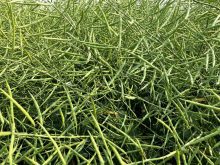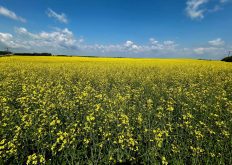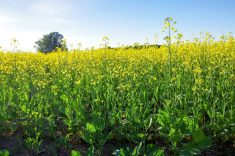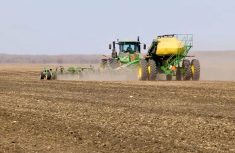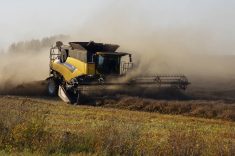Saskatoon — How important is biotechnology to Prairie farmers? On his farm, Saskatchewan farmer Maurice Delage says, the net profit from canola is about $100 per acre, making it his most profitable crop most years.
Delage, who now farms at Indian Head and was CEO of Aventis Crop Sciences (now Bayer CropScience) in North America until 2001, was a natural choice to speak to delegates at the 14th annual International Rapeseed Congress in Saskatoon this week.
While they’re very different plants — especially in their end-use products — canola and rapeseed are forever linked by their very similar appearance and long shared history.
Read Also

U.S. grains: Chicago grain prices fall amid profit-taking and dollar rebound
Chicago | Reuters – Chicago corn, soybean and wheat futures fell on Friday, pressured by profit-taking and a rebound in…
Canola, developed in the 1970s, was the result of plant breeders’ work to remove “undesirable” levels of erucic acid and glucosinolates from rapeseed oil and meal, thus creating the raw material for what’s now a common cooking oil in kitchens worldwide.
From there, canola carved out its own place in Canada’s economy. “The canola industry today accounts for somewhere between $19 billion and $20 billion in the Canadian economy and about 250,000 jobs,” Delage said.
Without biotechnology, he added, “this could not have happened.”
Developments in biotech increased canola yields and gave farmers tools to control weeds and disease, allowing canola to become a crucial and stable part of minimum-tillage cropping operations across the Prairies.
Top canola researchers, specialists and agronomists from around the world are in Saskatoon this week to attend this international conference hosted by Saskatchewan bioscience industry association Ag-West Bio and the Canola Council of Canada.
Because the event, which ends Thursday, only happens once every four years, they refer to it as the “Olympics of the rapeseed/canola industry.”
“It’s going very well so far,” said Wilf Keller, Ag-West Bio’s CEO. “We have about 900 delegates from 32 countries here.”
Of the 900 delegates, 360 are from Canada, 150 from China, and another 100 from Germany, making this a truly international gathering, with a very full agenda. “We have 175 speakers covering every aspect of research and development in canola.”
The conference also includes sold-out tours of fields and local research infrastructure.
Delegates are sharing information about technical aspects of biotechnology, making connections for future collaboration and making plans for future canola developments.
— Leeann Minogue is editor of Grainews. Follow her at @GrainMuse on Twitter.





